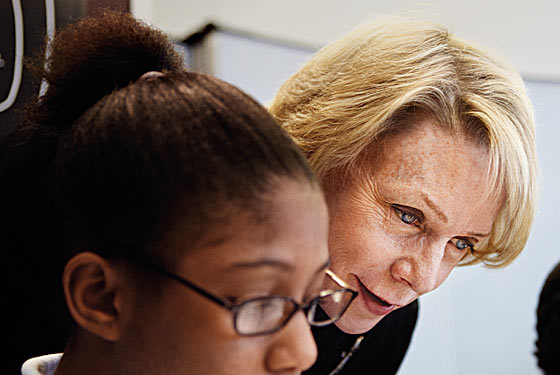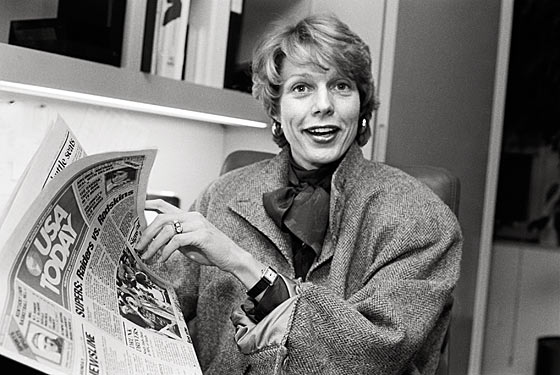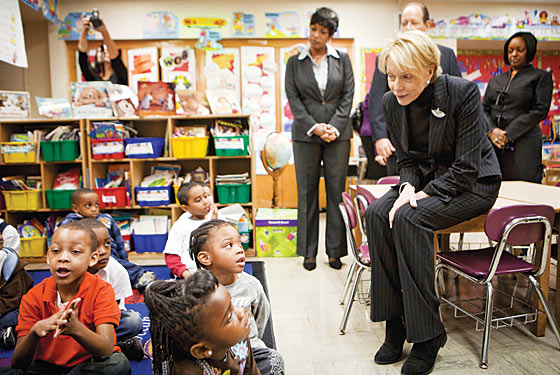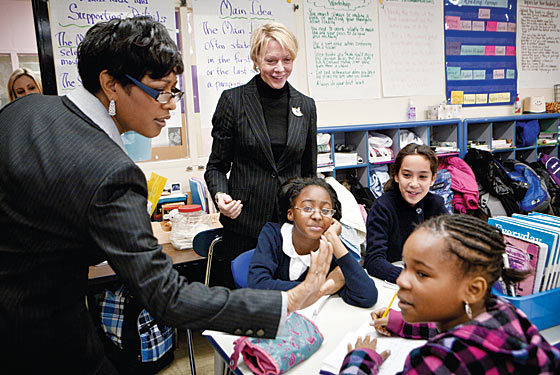http://nymag.com/news/
“Just Smile”
Mayor Bloomberg hired magazine executive Cathie Black as schools chancellor to sell his educational philosophy to the public. But she’s having a hard enough time selling herself.
- By Chris Smith
- Published Feb 6, 2011
 |
(Photo: Jeff Riedel) |
Cathie Black is lost in Queens. Her day had started well, with the Pledge of Allegiance at a Coney Island elementary school, then a brisk walking tour of one of the city’s best middle schools, Mark Twain. Black smiles nonstop as she’s hustled from math to English to art class by Twain’s legendary no-nonsense principal, Carol Moore. When Black lingers, quizzing a teacher, Moore barks, “Come on, Chancellor!” Black is startled, then grins. “The actual question,” she says, stopping into a science class that’s charting how temperature affects the osmosis rate of cells, “is, how do we clone Ms. Moore?”
Her next stop is a high school in Jamaica. Black’s car suddenly pulls to the curb. There’s a pause, then an abrupt U-turn in the middle of a busy street, followed by a frantic acceleration onto the Belt Parkway. Usually when Black goes east, she’s headed to her $4 million house in Southampton, in a more comfortable ride. Today, she’s wedged into the backseat of a city-issued Prius. The car slows. Hesitates. Turns right … onto a service road leading into JFK airport. Has Black, just weeks into a bumpy transition from magazine-company executive to boss of the city’s fractious public-school system, already decided to hop a flight and flee?
Another U-turn, then a dash onto the Van Wyck heading north—and into total gridlock. Black’s beleaguered driver inches across two lanes of bumper-to-bumper traffic, then lurches for the first exit, which leads to a thicket of auto-body shops and fast-food joints. The Prius pulls up in front of Hillcrest High School, somehow only ten minutes behind schedule.
Inside, Black shakes hands and listens intently as a group of the high school’s top students praise their teachers. Hillcrest is in many ways a success story. Its student body is rich in ethnicities and languages but poor enough that 68 percent of the kids qualify for free lunch. Five years ago, with the help of a Gates Foundation grant and management direction from New Visions for Public Schools, Hillcrest’s 3,000 students were divided into seven self-contained programs, and the four-year graduation rate has climbed to 70 percent. But classrooms are crowded, and Principal Stephen Duch, who’s had to trim spending by 10 percent in the past two years, fears additional budget cuts will worsen the strain. Black steps into a room full of kids huddled around laptops, part of the city’s new “Innovation Zone” project integrating online learning with brick-and-mortar schools. She asks rapid-fire questions—“How does it compare to your regular classes? Who grades it? How long have you been in an iZone? Who monitors it? Are these their own laptops? Can they work in teams?”—but takes no notes, though she clutches a small notebook covered in bright-red suede everywhere she goes.
Black is unfailingly pleasant, if a bit distant. Until she enters a business class. The teacher, Michele Gensler, tells Black that her students are preparing for a competition in which they’ll pitch mock start-ups to adult business leaders. Black’s blue eyes shine. For the first time today, she eagerly volunteers advice.
“Just smile,” she tells the students, leaning across a cubicle wall and looking at each of them in turn—and smiling. “Smile at them, and they’ll respond to you!” The students are quiet, not sure what to make of the cheery blonde stranger in the snappy charcoal-striped pantsuit.
Black continues her mini-seminar. “Each time that you rehearse your presentation,” she says, “say it out loud. No reading!”
“Yes, that’s what they do,” Gensler says.
“Are you going first?” Black says to a girl seated in front of her. “Well, think of it this way: You don’t have to do anything after that, and you can relax!”
“Actually,” Gensler says, “she has to close too.”
Black beams. “I bet you’re going to be great!”
 |
Black at USA Today in 1984. (Photo: Rhoda Baer) |
Mayor Michael Bloomberg has tried to improve what New Yorkers eat and breathe. Nothing he’s done, however, approaches the difficulty and importance of changing how the city’s public-school children think. First Bloomberg won control over the system in Albany; then he installed Joel Klein, a lawyer and corporate executive, as schools chancellor and backed Klein’s controversial reorganizations with millions of dollars. The effort injected welcome energy into the city’s reeling school system, but the results have been mixed: The grand experiment in charter-school expansion has yielded some creative gems, but nearly as many mediocrities. Parents have a wealth of new options but dread the competition for admission. Failing behemoth schools have been replaced by some thriving small schools, but many high-needs students have been shunted to the remaining big schools. Data has become a grinding obsession, and teachers have been scapegoated for problems not of their making. (Caveat lector: I have two children in the city’s public schools, and so far they’ve received generally excellent educations—albeit in schools whose methods and values were established before the Bloomberg revolution.)
The upheaval has brought the system to a pivotal moment. Good new schools are trying to establish firm roots. Too many others are still dysfunctional. High expectations have been instilled, and accountability established, but at a steep cost in bitterness. Last year, with Klein ready to depart the battlefield, Bloomberg had a chance to install a new leader and reestablish some credibility with the parents and teachers who think he cares only about the city’s elites and higher test scores. Instead, on the afternoon of November 9, the mayor strode to the podium in City Hall and unveiled Cathie Black as his pick, hailing the lifelong publishing executive as a “superstar manager.”
Last summer, New York State raised test-score standards, and the city’s proficiency rates crashed. New national curriculum guidelines are looming, necessitating an overhaul of the core courses taught in most New York schools. And, perhaps most critical, a massive state-budget deficit threatens to force the layoffs of thousands of teachers. In other words, this is a pretty good moment for a superstar manager of the school system. Could that really be Cathie Black?
On a blustery January morning, Black strides into the Chancellor’s Conference Room inside Tweed Courthouse, the immaculate headquarters of a very messy school system. She’s had the job for slightly more than two weeks now. She’s been all over the five boroughs, posing with adorable children and attending education forums. But she is still something of a cipher. At 66, she has a pixieish energy, though up close she’s endearingly ruddier in complexion than her lustrous official photographs. She makes the case for herself. “I’m an effective manager, I’m an effective leader, I have good communication skills,” she says. “I’m a decision-maker. I’m decisive.” And: “I’m a consensus builder, I’m a listener, I’m here to reach out.” She is also a bit of a flirt. Noticing that my security pass is stuck to the left thigh of my pants, Black points and says, “Huh! That’s kind of sexy.”
By itself, Black’s comment about my security sticker is harmless—except that she makes it one week after glibly joking that birth control could help solve school overcrowding, thereby setting off a small furor. It makes me wonder about her political instincts. She’s either admirably authentic or remarkably clueless about the brighter spotlight that now follows her.
That split extends to Black’s reputation among people who’ve worked with her during 40 years in the publishing business: Some corporate executives and former colleagues praise Black’s ability to run a tight ship, while others say her managerial talents are at best ordinary. “I never thought of her as a brilliant manager,” says a magazine editor who worked with Black for years. “I thought of her as a competent person. She was always kind of a mystery to me, because she kept getting big jobs and seemed to do all right with them, but it was never quite clear how that happened.”
Black’s climb up the magazine-advertising ladder was dogged and pragmatic. In 1966, after growing up in Chicago and then graduating from all-female Trinity College in Washington, D.C., she found a sales-assistant job at Holiday magazine and found her niche. In 1972, she joined the fledgling Ms. magazine, then moved to New York Magazine in 1977. “I’d heard Cathie speak at some things, and she was very good,” says Joe Armstrong, the editor and publisher of this magazine at the time. “She’s very driven, and she worked hard.” Armstrong made Black the first female publisher of a major weekly magazine. Colleagues, however, sometimes wondered whether Black’s energies were devoted to promoting her magazines or herself. “She would be in her office all day, and much of her time was spent writing notes: ‘Dear Dr. Kissinger, what a pleasure it was to sit next to you at dinner last night,’ ” remembers an advertising associate. “Tons of that stuff; that’s what she does. Her assistant would say, ‘Cathie’s going to a party, and she wants me to write up a history of every single person who’s going to be there.’ ”
 |
(Photo: Jason Andrew/Getty Images) |
In 1983, Black left New York for USA Today. “People thought I was crazy: ‘You’ve got a great job in New York and you’re going to put yourself into the fray of the newspaper business, where you’ve never been? With a start-up that is not going to make it?’ ” she says. “But I thought to myself, This is an opportunity to throw myself into a real game-changer. This could completely transform the future of the newspaper business.” Plus her husband of one year, Tom Harvey, a lawyer, was working for Republican senator Alan Simpson in Washington, D.C., not far from USA Today’s offices in suburban Virginia.
“She was transformational,” says Tom Curley, USA Today’s former president and now the head of the Associated Press. “She came in and had a profile in the ad community that was absolutely necessary. A general-interest national newspaper was a new thing and an odd duck, and she really got people beyond that. She has both the energy and the articulation skills to move the conversation down the road, and she did.”
Yet USA Today became profitable only after Black left to head a newspaper-industry lobbying group. In November 1995, Black was hired as president of Hearst Magazines. “Many of the magazines were doing very well when Cathie arrived,” says Valerie Salembier, who worked for Black at USA Today and soon joined her at Hearst, first as publisher of Esquire and now ofHarper’s Bazaar. “Cosmo has always been a big success; Redbookwas doing well; Good Housekeeping, Town & Country, Country Living—it was a strong group of magazines.”
Black carefully shored up that profitable core group while launching a few big hits and a number of misses. CosmoGirl, a spinoff from Cosmopolitan, struggled for nine years before being closed; Shop Etc. magazine lasted for only two. She revitalizedEsquire by hiring David Granger, who had been a top editor atGQ, Esquire’s longtime rival. “She’s remarkably direct,” Granger says. “Coming from Condé Nast, I remember [GQ editor] Art Cooper would spend hours every day trying to parse the tea leaves: Are you in? Are you out? What did Si [Newhouse] mean by what he said? With Cathie, you never had to wonder. She wanted her magazines and the people who worked for them to be successful. And she’s very direct in letting you know there was a better path than the one you were on.”
Her most dramatic delivery of cold reality came in January 2002.Talk magazine had been launched in a whirlwind of hype, glamour, and ego. Celebrity editor Tina Brown teamed with Harvey Weinstein of Miramax to create not just a monthly magazine but a book company that would synergize their access to Hollywood, Washington, and Wall Street. Or something. Hearst signed on as a financial and distribution partner. Which didn’t mean that the expensive conceptenjoyed Black’s enthusiasm. “When the idea is your idea, you usually champion it. And when it’s not, you usually don’t,” says Ron Galotti, the brash former publisher of Vogue who joined forces with Brown and Weinstein in the new venture. “And Talk wasn’t Cathie’s idea.” Black shut down the magazine after two money-losing years.
Talk was conspicuous at Hearst because it was a big risk and run by bold personalities; the magazine group under Black was otherwise dependably prudent and cautious. “Hearst is very proud of its workmanlike, professional, efficient, smart, bottom-line way of putting out their magazines,” a former Hearst editor says. “And they resented all the attention Condé Nast got, often by spending shitloads of money, which Hearst wouldn’t do. So they’d be envious in one way and superior in another way: ‘We’re really good managers; they just throw money at things.’ ”
Black’s time at Hearst included two enormous successes: O, the Oprah Magazine and Food NetworkMagazine. Black claims that the concept for both titles came out of “visioning” retreats she led with Hearst editors. But insiders credit Ellen Levine, the longtime editor of Good Housekeeping who is now Hearst’s editorial director, for doing the real labor to make both start-ups happen. Nevertheless, Black gave each the green light and helped make the crucial sale to Oprah Winfrey. She also kept Hearst’s magazines largely profitable through one of the worst downturns in mainstream publishing. “During the recent economic crisis,” Salembier says, “she made all of us believe, the editors and publishers, that we could do this with less people, that we were good enough and smart enough to problem-solve.”
Her budget trimming followed a pattern. “When Cathie was cutting costs, she would bring in somebody from the outside for a review,” a Hearst executive says. “Michael Wolf, the consultant, has been in here when he was at Booz Allen, he was in here when he was at McKinsey, and he will go at it in the mathematical pattern that they always use. Then the internal people will act on the findings. Cathie knew bringing some consultant in was more effective because it’s not personal.”
 |
(Photo: Jason Andrew/Getty Images) |
Black hired or retained talented lieutenants, like Hearst publishing director Michael Clinton and editor Kate White, whom Black moved from Redbook to Cosmo. “She did an excellent job for us,” says former Hearst Corporation CEO Victor Ganzi. “She was innovative at looking at new products, and she wasn’t wedded to the way things had been done in the past.” But Black’s claim to have “managed 2,000 people” at Hearst draws surprise, even from her friends. “Hmmm,” says one senior executive at the company. “Well, 2,000 people were under her. There are many different kinds of people on top. Some are great managers, and they move ahead, and they’re not going to walk around saying that they’re great managers or counting the number of people they manage, and they do a fine job.” Which wasn’t Black’s style: A Financial Times story called her “the First Lady of American magazines,” and she enthusiastically embraced the ceremonial aspect that the phrase implied, accumulating nine honorary degrees from colleges and universities. “She is a great platform speaker,” says a former colleague, when asked to name Black’s primary talent. “She can stir a group. You put her on a stage and she emotes, even with speeches that have been drafted for her. She’s encouraging and inspiring. She’s not poetic, but there’s an emotional component. It’s never facts and figures. It’s a rapture of ‘I believe in you, and I know you can do it, and this is what we need to do.’ What she says has some specific content, but it’s more about a belief system.”
Her aphorism-stuffed how-to-get-ahead-in-business memoir,Basic Black, came out in 2007, and Hearst threw a series of parties to help promote the book, rankling some staffers who thought Black was hogging the spotlight. One guest, a longtime colleague of Black’s, was reminded of a different setting. “I remember going into her home library, and it’s all these books:Swim With the Sharks Without Being Eaten Alive, What They Don’t Teach You at Harvard Business School. All these self-help business books, hundreds of them: ‘How to do the direct eye contact,’ ‘How to learn how to shake a hand,’ ‘How to learn to tell people you’re listening.’ All these tricks!” She was less of a superstar manager, in this view, than a gifted saleswoman of magazine ads—and herself.
Last June, the 66-year-old Black was kicked upstairs to a newly created position, chairman of Hearst Magazines, and replaced by 49-year-old David Carey, who’d been at Condé Nast. “She was given a certain period of time, a year or eighteen months, as chairman, as a gesture of respect and to ease the transition,” a friend at the company says. “Her time at Hearst had an expiration date. I’m sure she was deeply upset to have been replaced.” Black claims she was unfazed. “All batons have to be passed,” she says evenly. “I thought it was great for the company. In all of life, you just move on. I’m a glass-half-full person, always.”
“Her library is all self-help books. ‘How to make eye contact, shake a hand, tell people you’re listening.’ All these tricks!”
When Joel Klein accepted the job of schools chancellor, he told the mayor he’d be happy to stay for two full terms. But then Bloomberg decided limits didn’t apply to the mayor’s office and asked Klein to stay through the start of Bloomberg’s third term. Quietly, the mayor began looking for a new schools boss. As theTimes first reported, Bloomberg approached Geoffrey Canada, the founder of the Harlem Children’s Zone, who decided to stay put. Michelle Rhee, the combative ex-head of Washington, D.C.’s schools, also would have been a logical contender, but she was on her way to launching her own multi-million-dollar school-reform operation. So Bloomberg, in a move many of his top aides didn’t see coming, turned to Black.
It made a kind of sense to the mayor. Bloomberg prides himself on his quick, instinctive assessments of people—it’s part of what he, as a superstar manager himself, believes in. “You’ll leave a meeting with the mayor, and he’ll say, ‘That guy was really smart,’ and it sticks in his head,” a Bloomberg adviser says. “He keeps a mental list of bright people who he knows from various circles and who he thinks could do a great job in any setting in the administration.” And that is what happened with Cathie Black. “She had been in the back of his mind for some time,” the adviser says. “She runs in a similar social circle, and he was impressed with her. His view is actually simple: ‘Great manager, totally against type. People will think I’m brilliant for thinking outside the box on this—and anybody that doesn’t get it is wrong.’ ” Black didn’t deliberate long before taking the job. “I said to the mayor, ‘If you think I’m the right person, and this is the skill set you believe is really important to run the DOE through the remainder of your term’—it didn’t take me days of gnashing my teeth and rolling around and wondering if I should do this,” she says. “He has been in the trenches on this for almost nine years. So let’s go ahead.”
That Black is friendly with Diana Taylor, Bloomberg’s girlfriend, didn’t hurt her chances. But this hire was all Bloomberg. Choosing Black ratchets up the pitched argument that the mayor and others have been waging with the public-school Establishment for the past decade. In Bloomberg’s CEO-minded view, public schools are a closed society dominated by self-interested unions, desperately in need of free-market shock treatment. If only enlightened capitalists could wrest control of the schools from the hidebound, unionized teachers, the schools’ problems could be solved. This is a tremendously fashionable idea among the country’s business class, partly because it is so flattering to their self-image, and it’s reflected in the cult of Waiting for “Superman,” the 2010 charter-school-glorifying documentary starring Canada and Rhee that’s a favorite of the hedge-fund set.
 |
(Photo: Michael Nagle/Getty Images) |
The new chancellor brings a practical value when it comes to this group. “Cathie attended the Allen & Co. conference in Sun Valley every year as a Coca-Cola board member,” a corporate executive says. “In that room is several trillion dollars in net worth. If you look at who has funded these charter schools, it’s these same guys. One of her roles is to keep that going.” When Black talks about exploiting her ties to the business community, she sounds like a full-time, more energetic version of Caroline Kennedy, Bloomberg’s first emissary to the big-money donors. “I haven’t run across anybody that I know in the business world in the past five or six weeks who doesn’t say, ‘Just tell me what you want me to do,’ in this totally open way,” she says. “They want New York City schools to succeed. I saw a whole bunch of people the other night—‘Just call me! Anytime you want, just call me!’ Stan Shuman at Allen & Co., Terry Lundgren at Macy’s.” In the current climate, with public budgets being slashed, that pipeline matters more than ever to sustaining the growth of the charter business.
All of which, however, is secondary to why the mayor really hired Black as the new chancellor. Klein, for better or worse, was New York’s school-reform visionary. Bloomberg may say the system now needs a great manager, and he believes Black will turn out to be one. But what he doesn’t want, this time around, is big ideas. The mayor wants someone to sell his ideas.
The line that got her in trouble came in mid-January. Meeting with a group of Tribeca parents upset about school overcrowding, Black quipped, “Could we just have some birth control for a while? It could help us all out a lot.” She’d been apologizing ever since. Six nights later, Black attended her first public meeting of the Panel for Educational Policy, a monthly ritual that is supposed to give the appearance of community input into the school system but instead functions as a forum for desperate parents to vent their anger and beg for help. Black sat stonily onstage until 11 p.m. as she was booed and taunted with condoms. At home in her Park Avenue penthouse, the long day ended with a grilled cheese sandwich and a glass of wine.
“You know, it’s New York,” Black told me with a shrug the next morning. “And people are very opinionated, and so it’s quite an experience. You sit there and you just listen, you don’t respond. They have a point of view, or they’ve got placards, or they wrote songs. You know, it’s part of the American process. I did not bring my BlackBerry. I understand that had been a problem for too many people, including you know who,” she says, a mild jab at her predecessor, Klein, who was criticized for tuning out the demonstrators by reading e-mail. “But one could understand why you’d want to be on your BlackBerry, just doing whatever, crossword puzzles.” Last week, near the end of a raucous marathon hearing on school closings that went until 1:30 a.m., Black was less sanguine. When the crowd greeted her shouting for quiet with a mocking “Awwww,” Black topped it with an “Awwww” drenched in sarcasm. Then the mayor’s appointees to the panel voted unanimously to shut ten schools. Two days later, another twelve were axed. That night’s crowd chanted, “Black is wack” and “Black must go.” The week’s casualties included eight schools Bloomberg had opened.
What does Black think the furious reaction to her appointment says about the state of the school system? “I just kind of march forward,” she says. “They are going to have their own point of view. They’re either going to support me or they’re not. I’ve said I’m here to listen, we have the same goals: Children first.”
For someone who has spent her adult life as a saleswoman, Black can be surprisingly tone-deaf. But the problem isn’t that simple. “When you, for many, many years, have been talking to a crowd of people who depend on you for their salaries, it’s very basic. Nobody talks back to you in that room,” a former Hearst colleague says. “These people will talk back to her. This will continue to be a very difficult transition unless she has an intuitive side to her. I don’t know if she lacks one or she hasn’t had to practice it for fifteen years.” When Bloomberg selected her as chancellor, Black had to know she’d be caricatured as a rich Upper East Side elitist; with the schools scraping for cash, did she consider turning down a salary, a more or less symbolic move at her tax bracket but one that might have made her appointment more palatable? “No,” she says firmly. “I don’t think at the end of the day it would have meant a hill of beans.” Well, she did take a pay cut—to $250,000. “That’s for sure!” she says, laughing. “I’ve done my deal.”
 |
(Photo: Jason Andrew/Getty Images) |
Black’s most fervent sales pitch at the moment is for changing the way the city lays off teachers. State law requires systemwide cuts be made according to seniority. Black has been tirelessly on-message in pushing Bloomberg’s argument for more managerial discretion, hammering it home on NY1, writing an op-ed about the topic for the Post—coincidentally on the very day the Post’s editorial page championed the same idea. The teachers union is highly skeptical—citing flaws in the city’s methods for evaluating teachers, which lean heavily on test scores—and suspicious that the city’s real desire is to go after its oldest, highest-salaried teachers. “It’s not about age. It’s about their capacity to be a really effective teacher,” Black says. “The passion is about having the best teachers. And the system knows who are the good ones. The good ones tend to come together, they do more innovative things, they share best practices, and the others hide out.” Are there parallels between the metrics used to evaluate magazines and teachers? “I am about data,” Black says. “The magazine statistics—I used to say magazine math is really easy. It is about circulation performance, it’s about advertising revenue, it’s about share of market. You’ve got pretty simple indicators—do the readers of this magazine like it enough to subscribe? To renew? To buy on the newsstand? And does it have a place in the advertising market? As we look at, over the course of the next months and months—of all of the pilots we have in the marketplace here, in our schools, as we are transforming schools, as we are starting new schools, we need to be rigorous, as we are: How are the kids doing? How are the graduation rates? Are these children being educated in a way that they can go to college and they can be prepared for college? Or if they’re on a career track, are they going to go into a career that’s going to be promising?”
Black is but one part of the sophisticated campaign to rewrite the teacher-layoff rules. The Post’s news pages have been trumpeting a group of younger teachers who are supposedly rebelling against the inflexibility of the UFT’s leadership; the group is fueled in part by $160,000 that a private group co-chaired by Klein passed along from the Gates Foundation, one of the most powerful backers of Bloomberg’s education reform. Closing the circle, Klein now works for Post owner Rupert Murdoch. The ultimate target of all this lobbying is Governor Andrew Cuomo, whose backing is key to any significant overhaul of teacher-layoff policies. “A lot hinges on where Andrew comes down,” one Bloomberg adviser says. The mayor’s campaign contributions to State Senate Republicans could pay off as well. “If we have [Republican majority leader Dean] Skelos onboard and pass a good bill out of the State Senate, and raise enough public attention on the issue, through editorials and ads and everything else, and the governor is pounding away, it gets harder for Shelly [Silver, the Assembly majority leader] to ignore it,” another Bloomberg strategist says. He also highlights a further bit of leverage. “Quite frankly, this is Rupert’s top issue,” he says. “Does Andrew really want to lose thePost over this? And also make enemies of Mort Zuckerman and Bloomberg in his first few months?” If Cuomo pushes for the union and the city to negotiate a relaxation of the seniority rules, it would be an enormous victory for Bloomberg, with a minor assist from Black. But her real campaign is only beginning.
Bloomberg has already made one Albany deal related to Black—though that one was forced on the mayor. Perversely enough, it could also turn out to be the best thing for the school system. In exchange for granting Black the necessary non-educator waiver to become chancellor, New York State’s education commissioner compelled Bloomberg to install as Black’s second-in-command someone with actual education experience. The mayor picked Shael Polakow-Suransky.
The 39-year-old South African immigrant is a fascinating character and a seeming contradiction. The son of anti-apartheid intellectuals, Polakow-Suransky attended an experimental school-without-walls public high school in Ann Arbor, Michigan, and then Brown University before moving to New York and becoming the founding principal of a small high school in the Bronx. Yet Polakow-Suransky has also become a true believer in standardized testing and data and was chief accountability officer under Joel Klein.
“If you look at the old Board of Ed reports in the late nineties, they don’t even list student-achievement data. They have overcrowding data, they have safety data, they have how many lunches. Nothing about whether kids are learning or not,” Polakow-Suransky says. “We’ve taken a system that in many parts of the city was deeply neglected and brought a focus. I’ve been a teacher, an assistant principal, a principal. And I will never forget how demanding and interesting it is to be a teacher. It’s one of the hardest jobs you can do, and it takes time and a lot of support to do it well. But we need to be honest when people are not performing.”
1 comment:
Cutting pensions and seemingly targeting the most loyal teachers is a misfortune that many educators are currently facing. This can be a heartbreak for dedicated teachers that have a long-standing history with their organization. Some are even unable to return to their profession...
Post a Comment